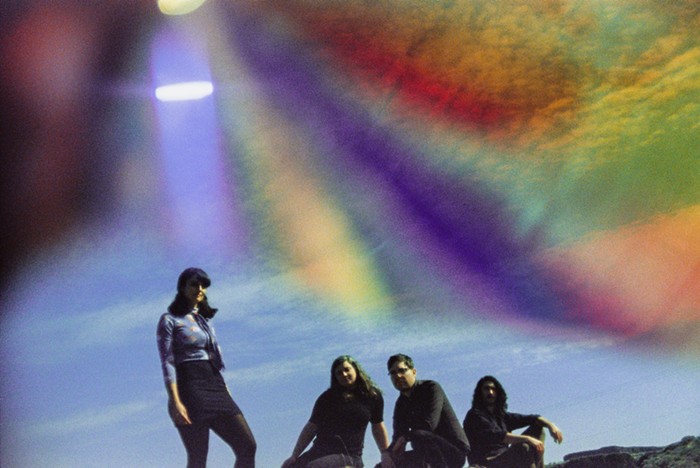Arthur & Yu, the vintage folk duo of Grant Olsen and Sonya Westcott, began, like all the great folk duos, with an online classified ad.
Westcott, formerly of Bay Area band Rogue Wave, placed an ad two years ago looking for a folk project to sing with—citing inspirations like recently unearthed rough gem Karen Dalton—and caught Olsen's eye.
"I sent her some four-track tapes in the mail and she checked them out," he says. "Then we met at a bar and I gave her some more. It was two double-sided tapes, four or five songs. And she liked it, I guess. She picked me out of all the classifieds suitors."
On the duo's debut album, In Camera—the first release for Sub Pop offshoot Hardly Art—Olsen and Westcott don't seem like recent acquaintances. There's a gentle intimacy to their home-recorded harmonies that sounds more like the product of old friends or even lovers (they're not). But their warm sound and close creative relationship took time to develop.
"Most of the first year was just hanging out and playing in my living room with the guitar," says Olsen.
"There was a lot of time spent just getting to know each other," agrees Westcott. "Getting comfortable with singing, making sure we didn't hate each other."
"We'd go over old tapes I'd put together," says Olsen. "Then we kind of worked on songs, or sat quietly, strummed a chord or two and got shy, drank another beer, and after a few of them, played some songs."
Olsen began recording these sessions in his living room, and in the summer of last year the duo went into a studio with a full band. From those recordings, the band assembled a 10-song demo. In the end, they used only one studio track, relying mostly on Olsen's earlier, lo-fi recordings.
"We just picked the best versions of everything," he says. "We had studio versions of a lot of the songs on the record, but we liked the more intimate feeling a little bit more."
These demos, with only a few changes, became In Camera.
"The people at Hardly Art got hold of the 10 songs," says Olsen. "And they came back and pretty much wanted to put it out as-is, which freaked us the fuck out. We were blown away that they were interested at all, and then that they wanted to put it out just like that. They were pretty adamant about not fucking with it too much. Which is great, because I don't think we could have that again if we put out another record, that pure intention without any idea of who's gonna hear it."
The resulting album is palpably intimate—you can almost hear the close quarters of Olsen's living room in his mixes. And while they sometimes play with themes of naïveté and innocence (the name Arthur & Yu derives from their old childhood nicknames)—there's nothing at all childish about their songcraft on tracks like the alternately coy and seductive "Lion's Mouth" or the sweetly echoing "Come to View (Song for Neil Young)." Olsen layers what he describes as "cheap" instruments—acoustic guitar, Casio keyboards, pennywhistles and melodica, beer bottles and garbage cans for percussion—to create rich, sepia-toned pop. Much of the album's charm comes from the duo's close vocal and lyrical interplay—Westcott's clear, pitch-perfect intonation elevates Olsen's rougher but even singing.
Arthur & Yu cite obvious touchstones such as Lee Hazlewood and Nancy Sinatra, Joe Meek, and the Everly Brothers. There are also hints of the Velvet Underground's fuzz and drone at the edges of their pretty pop duets. Their traditional approach flies in the face of the modernized, willfully psyched-out and abstracted freak-folk of the moment.
There is nothing modern-sounding about In Camera. Every song and every sound are shamelessly derived from the soft pop and psych-friendly folk of decades past. From a less talented team, it might come off as cloying pastiche, but Arthur & Yu's homage is clearly thoughtful and sincere.
"I think that's maybe why I've never made records before, and I'm almost 30," says Olsen. "I always really wanted to do something brand-new, and I guess I've kind of realized that I probably won't ever be able to. So I've gotta start somewhere and try to learn from some of the best, and hopefully that will mutate into something else down the road. And in the meantime, we get to subject listeners to that learning process."![]()


















